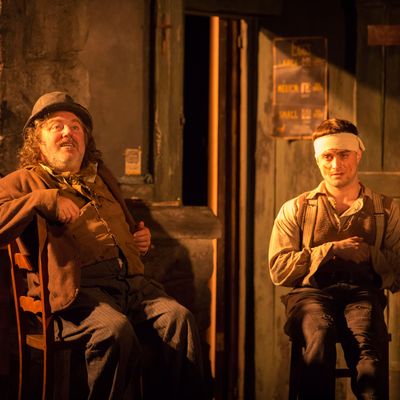
Who’s the worst Irish on Inishmaan? The competition is fierce. There’s the “newsman” Johnnypateenmike, who extorts food for his paltry gossip while trying to kill off his ancient and hideous mammy with drink. There’s young Helen, as nubile as she is vicious, who enjoys kicking grown men in the bollocks for no reason and pegging eggs at clergymen. (“If God went touching me arse in choir practice,” she blithely explains, “I’d peg eggs at that fecker too.”) Her dimwit little brother Bartley is interested in exactly two things: telescopes and sweets, about which he chatters at soul-numbing length. And the two old sisters who run the general store, which sells the sweets and little else, are half-mad with stage eccentricity. Eileen hoards their stock of Yalla-Mallows and Mintios, eating their miserable profit and frustrating Bartley. Kate, when anxious, talks to stones.
Among such ogres, the old sisters’ 19-year-old ward, Billy Claven, whose parents died at sea under mysterious circumstances when he was a baby, comes off as a saint, or at least quasi-normal, despite two habits the rest find suspicious: He stares at cows and he reads. That he was also born with a severe deformity — his left arm is crumpled, and his left leg sticks straight out like a branch — is clearly both a dark joke and a symbol in the playwright Martin McDonagh’s cosmology: an outer expression of the idea that on this island in extremis, a speck stuck in the North Atlantic off Galway with barely 200 inhabitants, humanity is itself defective. Or perhaps all Irish are. McDonagh — and Michael Grandage, who directs this near-perfect revival of the 1996 play, starring Daniel Radcliffe as Billy — pull out every stage-Irish trope for mockery: the flute music, the dour demeanors, the drink, the damp stone huts, the foul language, the overcolorful names. (Another character is Babbybobby Bennett, sometimes also known as Bobbybabbybobby.) It’s hilarious — unless, I suppose, you’re drunk, damp, deformed, demented, Irish, or human.
Even then you would have to appreciate the astonishing narrative thrift. As the play, set in in the early 1930s, opens, Johnnypateenmike arrives at Kate and Eileen’s store to sell the first interesting piece of “news” he’s ever had:
From Hollywood, California, in America they’re coming, led be a Yank be the name of Robert Flaherty, one of the most famous and richest Yanks there is. Coming there to Inishmore they’re coming and why are they coming? I’ll tell you why they’re coming. To go making a moving picture film will cost o’er a million dollars, will be shown throughout the world, will show life how it’s lived on the islands, will make film stars of whosoever should be chose to take part in it and will take them back to Hollywood then and be giving them a life free of work, or anyways only acting work which couldn’t be called work at all, it’s only talking.
Bartley and Helen, the latter automatically expecting to be chosen for stardom, arrange for Babbybobby to take them to Inishmore the next day; Billy, seeing his chance to escape a life of extreme emotional deprivation and constant patronizing that borders on cruelty, plays on Babbybobby’s sympathies to let him come along. He’s deluded, of course, as everyone tells him; the film’s director won’t be looking for “a little cripple star” to sail to America for a screen test. And yet, it’s Billy who doesn’t return to Inishmaan, with Helen and Bartley, a few days later. Naturally no one is happy for him:
EILEEN: I hope the boat sinks before it ever gets him to America.
KATE: I hope he drowns like his mammy and daddy drowned before him.
EILEEN: Or are we being too harsh on him?
Such harshness is funny, certainly, but only because the play moves too fast for pain to register. Truth be told, it could move even faster; though a swift two hours, it occasionally drags as the eccentricities pile up like Helen’s eggshells. They are not, finally, the point, for The Cripple of Inishmaan is not in fact a comedy, except to the extent that comedy may be defined as a tragedy in which the curtain comes down too early. That’s true here, as each character’s craziness, beautifully inhabited by an excellent cast, eventually reveals itself as an outgrown garment, insufficient to cover the naked pathos beneath. The fabric keeps gapping. This is especially evident in Billy, whose clothing literally does not — cannot — fit, and who, cow-starer and book-reader that he is, is the only one who seems to be aware of his plight. It’s a perfect role for Daniel Radcliffe, with his lonely-little-wizard persona by this point hard-wired. Yet he’s also grown tremendously as an actor, so that his wiring is just a starting point. Note the acknowledgement of truth in his eyes — far more painful than sadness or anger — when Helen disabuses him of his last beautiful illusion, the idea that his drowned parents loved him. “They loved you?” the witchy girl scoffs. “Would you love you if you weren’t you? You barely love you and you are you.”
Call it a comedy of despair: for a country that can’t be such a bad place if McDonagh keeps writing about it, and for all of us.
And by the way, the movie really happened: Flaherty’s fictionalized documentary Man of Aran was released in 1934. At that year’s Venice International Film Festival it won — wait for it — the Mussolini Cup.
The Cripple of Inishmaan is at the Cort Theatre through July 20.
*This article appears in the May 5, 2014 issue of New York Magazine.




